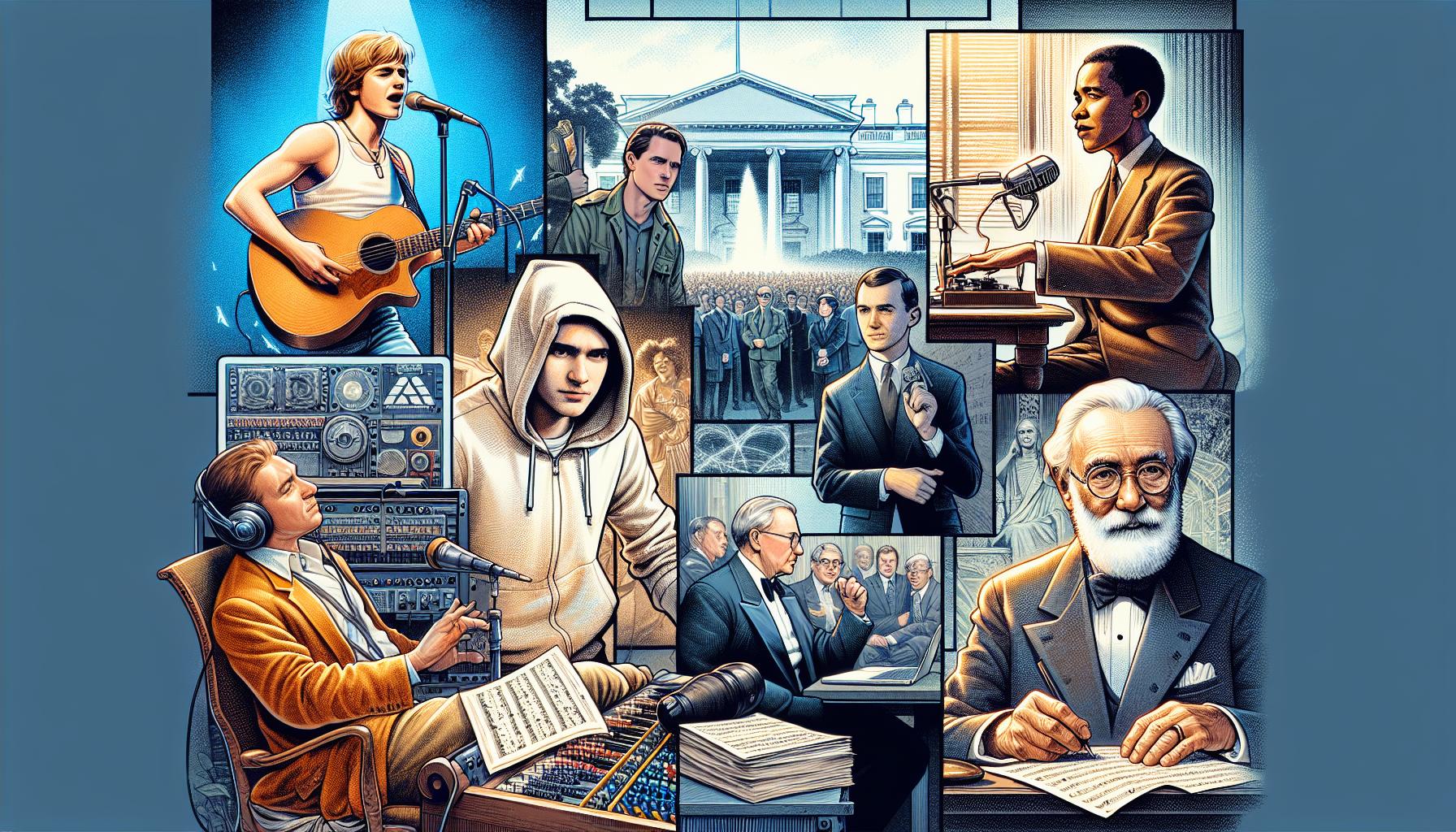Biopics have a unique way of drawing us into the lives of extraordinary individuals, transforming historical facts and personal triumphs into compelling cinematic experiences. Whether it’s the story of a visionary artist, a relentless leader, or an unsung hero, these films offer a deep dive into the complexities of human character and the circumstances that shape their destinies.
As film enthusiasts search for both inspiration and entertainment, biopics stand out as a genre that satisfies both. They not only educate us about significant figures and events but also stir our emotions, making us laugh, cry, and reflect. In this article, we’ll explore our top picks for biopics that not only captivated audiences around the world but also left an indelible mark on the art of filmmaking. Join us as we delve into these masterpieces that bring history to life in the most enchanting ways.
Ray (2004)
Overview
Ray, released in 2004, stands out as a profoundly moving biographical film about the life of Ray Charles, one of the most talented and influential musicians of the 20th century. Directed by Taylor Hackford and featuring an Oscar-winning performance by Jamie Foxx, the film meticulously chronicles Ray Charles’s rise from humble beginnings in the South, through his struggle with tragic personal loss and addiction, to his ultimate triumph as a pioneering musical genius.
Performance and Impact
Jamie Foxx’s transformation into Ray Charles is nothing short of spectacular; he not only masters the musical skills but also the mannerisms and the speaking voice of Charles, making it a landmark performance of his career. The film’s detailed portrayal of Charles’ blindness and how it affected his life and music provides a deeper understanding of the personal challenges he faced.
The narrative structure of Ray effectively combines elements of his music career with his private life, presenting a balanced view of his professional achievements and personal obstacles. Notably, the use of actual recordings by Ray Charles adds authenticity and a powerful auditory experience to the movie.
Design and Visual Aesthetics
The production design and costume design by Stephen Altman and Sharen Davis, respectively, impeccably recreate the era in which Charles rose to fame. From bustling club scenes to intimate studio settings, the settings transport the audience to the mid-20th century. The cinematography captures both the energy of his performances and the personal moments of vulnerability, creating visually compelling scenes that complement the narrative.
Comparison and Value
Compared to other musical biopics, Ray stands out for its in-depth focus and unflinching portrayal of the artist’s life, setting a high standard for biographical storytelling in film. It offers a captivating blend of drama, music, and history, making it a valuable film not only for fans of Ray Charles but for anyone interested in the complexities of artistic genius and personal resilience.
Market Reception and Legacy
Upon its release, Ray received critical acclaim for its strong narrative and Jamie Foxx’s performance, which earned him several awards. The film grossed over $124 million worldwide, demonstrating its popular appeal. It has since been considered a critical piece in the genre of musical biopics, influencing subsequent productions and perpetuating the legacy of Ray Charles through cinematic storytelling.
The King’s Speech (2010)
Overview and Historical Context
“The King’s Speech” is an exceptional biopic, directed by Tom Hooper, that centers on the true story of King George VI, portrayed by Colin Firth, and his struggle to overcome his stammer. Set against the backdrop of the looming Second World War, the film explores the King’s personal challenges and his unexpected ascent to the throne following his brother’s abdication.
Performance and Character Development
Colin Firth delivers a masterful performance that earned him an Academy Award for Best Actor. His portrayal of King George VI’s vulnerability and determination is deeply moving and effectively humanizes a historical figure. The dynamic between Firth and Geoffrey Rush, who plays speech therapist Lionel Logue, adds a rich layer of camaraderie and tension to the film, enhancing its emotional impact.
Cinematic Elements
The film excels in its production design and careful attention to period detail. The cinematography, led by Danny Cohen, uses a palette of muted colors that evokes the era beautifully and adds a somber tone that mirrors the King’s internal struggle. The use of tight, intimate camera angles positions the audience close to the characters, making King George’s personal victories feel universally triumphant.
Impact and Reception
Upon its release, “The King’s Speech” was met with widespread acclaim, lauded for its historical accuracy and the depth of its character portrayals. It garnered multiple awards, including Oscars for Best Picture and Best Director. The film not only captivated audiences worldwide but also sparked discussions about the complexities of leadership and the power of vulnerability.
Comparison and Legacy
Much like “Ray,” “The King’s Speech” sets a high bar in biographical storytelling by combining superb acting with strong narrative drive and visual storytelling. It stands out for portraying not just the duties of a monarch, but the personal hurdles that come with public speaking, resonating with anyone who has faced their own fears and challenges.
Bohemian Rhapsody (2018)
Following the impactful narratives of “Ray” and “The King’s Speech,” “Bohemian Rhapsody” emerges as another stellar biopic that captivates audiences with its vivid portrayal of one of music’s greatest icons, Freddie Mercury. Directed by Bryan Singer, this film meticulously chronicles the rise of the legendary rock band Queen, with a sharp focus on Mercury’s life, his musical genius, and his struggles.
Casting and Performances
Rami Malek’s transformation into Freddie Mercury is nothing short of phenomenal. His embodiment of the late rock star’s flamboyant stage presence and vulnerable off-stage persona garnered him an Academy Award for Best Actor. Malek’s performance is supported by a strong ensemble cast including Lucy Boynton, Gwilym Lee, Ben Hardy, and Joe Mazzello, who bring depth to their portrayal of the band members and key figures in Mercury’s life.
Cinematic Elements
“Bohemian Rhapsody” is a visual and auditory spectacle. The film’s editing, particularly during the concert scenes, captures the exhilarating essence of Queen’s live performances. The sound mixing, which flawlessly blends Mercury’s real voice with Malek’s, offers an immersive experience that is both authentic and emotionally stirring. Nevertheless, some critics have pointed to the film’s conventional approach to storytelling and questioned its historical accuracy. Despite these critiques, the film succeeds in creating an engaging narrative that appeals broadly, much like the band’s eclectic discography.
Cultural and Emotional Impact
The film does more than just recount the events of Mercury’s life; it explores the themes of identity, loneliness, and perseverance. Mercury, portrayed as both an enigmatic showman and a man seeking love and understanding, resonates with many for his unapologetic individuality and his fight against societal expectations. This biopic not only revisits the legacy of Queen but also stirs a deeper appreciation for Mercury’s role in challenging cultural norms through his music and public life.
“Bohemian Rhapsody,” while not without its controversies regarding factual representation, stands as a compelling testament to the enduring influence of Freddie Mercury and Queen, continuing the legacy of detailed, inspiring biopics that blend real-life heroism with cinematic storytelling.
The Social Network (2010)
“The Social Network,” directed by David Fincher and written by Aaron Sorkin, chronicles the tumultuous beginnings of the social media giant, Facebook. The film focuses on founder Mark Zuckerberg, portrayed by Jesse Eisenberg, and the contentious legal battles that followed the website’s exponential growth. Through sharp dialogue and gripping narrative, this biopic delves into themes of ambition, betrayal, and the complex nature of friendship and business.
Production and Design
David Fincher’s direction brings a stylish, almost clinical precision to the film, utilizing a cool color palette and a dynamic soundtrack by Trent Reznor and Atticus Ross. The cinematography underscores the intensity and pace of tech start-up culture while maintaining an intimate focus on the characters’ turbulent relationships. The film’s design reflects both the sophistication and the simplicity of the early 2000s tech environments, adding authenticity to the setting.
Performance and Characters
Jesse Eisenberg delivers a standout performance, embodying Zuckerberg with a blend of genius-level intellect and awkward social nuances. His portrayal invites viewers to question the motivations and morality of their real-life counterparts. Andrew Garfield, as co-founder Eduardo Saverin, provides an emotional anchor, portraying betrayal with subtle yet powerful expression. Their dynamic propels the film, making the personal stakes as engaging as the legal drama.
Comparative Analysis
Unlike “Bohemian Rhapsody,” which thrives on its musical spectacle, “The Social Network” excels through its screenplay and character study. Both films share a focus on the rise of influential cultural phenomena, but “The Social Network” opts for a more subdued yet intense narrative, avoiding the glamorization of its subjects. This approach allows for a gritty, realistic portrayal of the challenges faced during the creation and scaling of Facebook.
Value and Impact
“The Social Network” remains highly relevant as it addresses the impact of technology on personal relationships and society at large. At its release, it was praised for its contemporary relevance and has continued to be a topic of discussion in conversations about privacy, technology, and entrepreneurship. Financially, it was also a success, offering considerable returns against its modest budget, further proving its value in both cinematic and educational contexts.
The Imitation Game (2014)
Shifting from the tech innovator theme in “The Social Network”, “The Imitation Game” introduces us to another brilliant mind, Alan Turing, portrayed by Benedict Cumberbatch. This biopic dives deep into the life of the mathematician and logician who played a pivotal role in cracking Nazi Germany’s Enigma code during World War II. The film not only showcases his professional achievements but also poignantly covers the challenges he faced due to his homosexuality, which was then considered a criminal offense in the UK.
Design and Production
“The Imitation Game” thrives on its meticulous attention to historical detail and the wartime ambiance. The production design successfully resurrects the 1940s era, from the war-torn landscapes to the interiors of Bletchley Park where Turing and his team worked on the Enigma machine. The subdued color palette and period-appropriate costumes further immerse viewers in the time period.
Performances and Direction
Benedict Cumberbatch delivers a compelling performance, capturing the essence of Turing’s genius, vulnerability, and inner turmoil. Keira Knightley, as colleague Joan Clarke, provides a strong supporting role, offering a window into the gender biases of the time. Directed by Morten Tyldum, the film balances the intensity of war-time espionage with the personal drama of Turing’s life, creating a gripping narrative.
Comparison with Other Biopics in the Category
Unlike “The Social Network,” which deals with modern technological achievements and corporate betrayals, “The Imitation Game” presents a historical perspective, focusing on the impact of technology in warfare and the personal sacrifices of its innovator. Both films, however, explore the theme of isolation and misunderstanding that often accompanies great minds.
Performance and Durability
The portrayal of Turing’s intellectual and emotional battles contributes to the film’s lasting appeal. Its historical accuracy combined with stellar performances ensures that “The Imitation Game” resonates emotionally and educationally with its audience.
Within its biopic category, “The Imitation Game” stands out by blending historical drama with the deep personal conflicts of its protagonist, offering viewers both a lesson in history and a touching human story.
More Notable Biopics
Following the exploration of “The Imitation Game,” the genre of biographical films continues to offer a myriad of compelling stories that captivate audiences worldwide. For instance, “Selma,” which details the historic 1965 march from Selma to Montgomery led by Dr. Martin Luther King Jr., stands out for its poignant portrayal of the civil rights movement. The film’s acute attention to the emotional intensity of the struggles and the powerful leadership of Dr. King, played by David Oyelowo, leaves a lasting impact on its viewers.
Moreover, “Lincoln,” directed by Steven Spielberg and featuring Daniel Day-Lewis in a career-defining role as President Abraham Lincoln, delves deep into the intricacies of Lincoln’s presidency during the American Civil War. The film shines a light on the president’s tumultuous efforts to abolish slavery, showcasing his political savvy and the moral dilemmas he faced. The performance by Day-Lewis, coupled with Spielberg’s masterful direction, brings a significant historical figure to life with gripping authenticity.
Transitioning to a different realm of biopics, “Amadeus” invites audiences into the intricate world of Wolfgang Amadeus Mozart, portrayed with a vibrant flair by Tom Hulce. The movie, set largely in Vienna in the latter half of the 18th century, contrasts Mozart’s genius with the jealousy of his contemporary, Antonio Salieri. Through sumptuous costume design and a divine orchestral score, “Amadeus” offers a visually and audibly enriching experience that charts the highs and lows of Mozart’s life and career with dramatic intensity.
Each of these films not only provides entertainment but also enriches viewers’ understanding of the historical and cultural backdrops they explore. Such biopics blend the art of filmmaking with the art of storytelling, bringing closer to home the lives of prominent figures who have shaped pivotal moments in history.
Final Thoughts on Biopics
Choosing the best biopics involves delving into how well each film captures the essence of its subject and the impact it leaves on its audience. From the musical genius of Freddie Mercury to the political acumen of Abraham Lincoln, these films offer a window into the complexities of influential figures. They’re not just stories; they’re reflections of perseverance, innovation, and the human spirit. Whether it’s the emotional depth of “Ray” or the dramatic intensity of “Lincoln,” these biopics succeed in making historical and cultural icons accessible and relatable. They remind us that behind every renowned personality is a deeply personal story waiting to be told.



 RELATED POSTS
RELATED POSTS





0 Comments